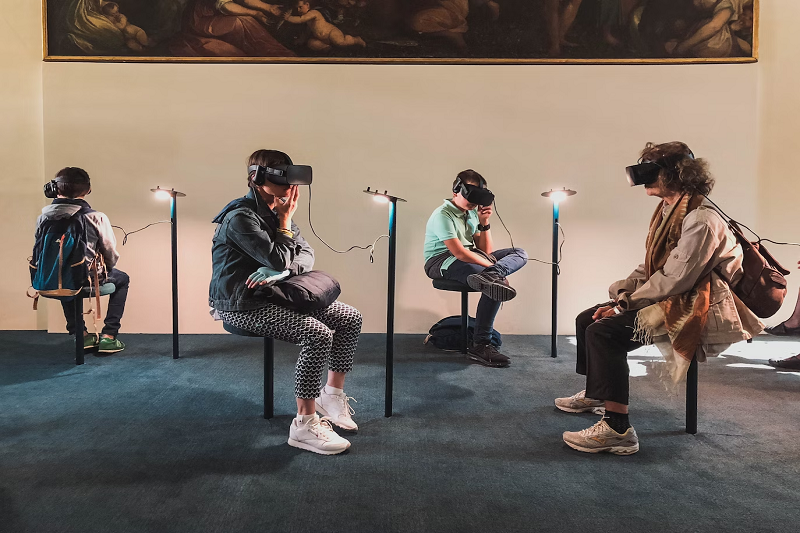Sponsored post from Bazoom Group
Gaming has changed tremendously from its humble beginnings of pixelated graphics and simplistic gameplay. The industry has evolved, continually pushing the boundaries of technology. It has given rise to groundbreaking advancements, including Virtual Reality (VR), Augmented Reality (AR) and Cloud Gaming, amongst many others. With these cutting-edge technologies, gamers can now access limitless possibilities, including immersive gameplay, convenience and accessibility, and new avenues for connection and competition. The article thoroughly explores how these emerging technologies transform and influence how you interact and experience the gaming world. But before delving deep into these technologies, it’s essential to examine the drivers of this change; software developers.
The role of software developers

Software developers play a pivotal role in driving tech innovation in gaming. Attending a software bootcamp equips software developers with the skills to write code that powers games, continuously developing new features and updates. By leveraging their expertise in coding languages, software developers create immersive experiences by introducing innovative mechanics, stunning graphics and stunning sound effects.
They also develop tools that allow game designers to prototype and test ideas swiftly, ensuring that only the best concepts make it to the final product. Additionally, software developers create streamlined game development processes through tools like level editors and asset management systems. Software development ranks as one of the most in-demand jobs because software developers are the architects behind the code that powers technologies like AR, VR and cloud gaming which are discussed extensively below.
Virtual reality (VR)
Virtual Reality (VR) revolutionizes gaming by providing unparalleled immersion and opening new realities. With VR, gamers can enter fully immersive 3D environments and interact with their surroundings in ways never before possible. This technology enables developers to create games that are incredibly realistic and engaging. For instance, players can explore virtual worlds or engage in epic battles on virtual battlegrounds.
By harnessing VR technology, developers can craft detailed and lifelike environments that truly transport gamers into the heart of the game. Furthermore, VR enhances social interaction among players, enabling communication through voice chat or text messaging while exploring shared virtual realms. The popularity of VR among gamers speaks to its ability to provide immersive experiences and new realities that redefine the gaming landscape.
Augmented reality (AR)

Augmented Reality (AR) revolutionizes gaming by seamlessly blending the virtual and physical worlds. AR overlays digital elements onto the real world, creating interactive experiences that enhance gameplay and elevate engagement. Games like Pokemon Go allow players to explore their surroundings while capturing virtual creatures, while others like Ingress incorporate real-world locations as portals to be charged. A game like Zombies, Run! encourages players to flee virtual zombies while traversing their neighborhoods.
The integration of AR enhances gameplay, sparks imaginative storytelling, and brings people together through shared augmented realities. As AR technology advances and becomes more accessible, gamers can look forward to even more mind-blowing gaming experiences that bridge the gap between the virtual and physical realms. By merging the physical and virtual realms, AR introduces endless possibilities for game developers and players.
Cloud gaming
Cloud gaming is a game-changing technology that has transformed how people play video games. It enables gamers to access high-end titles without expensive hardware or large downloads. Powerful servers in the cloud handle all the processing power and storage. As such, players can enjoy their favorite games from any internet-connected device, including smartphones, tablets and laptops.
Cloud gaming eliminates the hassle of physical discs or downloads, making it easier than ever to access new titles. Moreover, it empowers developers to create more complex and immersive experiences by leveraging the capabilities of cloud servers. Expansive virtual worlds with stunning graphics and realistic physics become achievable, pushing the boundaries of what’s possible in gaming. As such, cloud gaming opens up a new realm of possibilities for game designers and players.
In conclusion, as evidenced throughout the article, the immersive experiences offered by VR, the blending of virtual and real worlds through AR, and the accessibility and flexibility of Cloud Gaming are transforming how people play, connect and experience games. As these technologies advance and become more accessible to a broader audience, people, especially gamers, can expect more significant innovations and a more immersive and interactive gaming future.











